Early Intervention in Seminole County Helps Struggling Students Become Better Readers
Print This Post
BY DIANA ST. LIFER
The strategy to improve grade-level reading in Seminole County is simple: Identify struggling students at an early age and give them the individual attention they need to improve. And that strategy appears to be working. In 2006 just 72.7 percent of third graders in the county were meeting or exceeding CRCT standards. By 2012, that number had increased to 97.4 percent.
“That’s a huge jump,” said Beth Capuson, coordinator of the Seminole County Family Connection Collaborative. Capuson has been with the Collaborative since 2008, right about the time when Georgia’s Communities of Opportunity Initiative was taking off. The program focused on enhancing the economic vitality of rural Georgia communities, and when eyes turned to the needs in the 257-square-mile county located in the southwest tip of the state, one issue couldn’t be ignored.
“As we began talking about things we could do to make a difference in our county, the one thing that kept coming up was our grade-level reading scores, ” said Capuson. “We had several meetings, and at the end it was clear to everyone that we needed to do something that focused on helping our children read better.”
The discussion led to the creation of a reading lab where pre-k and kindergarten students who are struggling with reading could get one-on-one instruction. “We’ve had great success with targeting students early on,” Capuson said. “These are students who, had they not had the opportunity to receive help, would be having a very difficult time.”
There are 14 students taking advantage of the reading lab, which is located in the elementary school. Most of the tutors are volunteers in the community, many of whom are retired educators.
 |
Capuson says the individual attention the students receive has made a big impact on their improvement. “The results have been phenomenal,” she said. “Often times the children have questions about something that didn’t click in the classroom. When they work one-on-one with a tutor they don’t’ have to wait to ask a question. The tutor is right there for that student.”
When the students aren’t in class or at the reading lab, the Seminole County Public Library in Donalsonville is another place for them to engage in structured reading activities and programs. “Our public library is a huge asset,” Capuson said. In addition to the activities that take place in the building, the library’s website is replete with information and links to help parents and teachers with early reading initiatives. “There has been a big push statewide to help our children read better—and at an earlier age.”
Gov. Nathan and First Lady Sandra Deal’s Read Across Georgia Month to support Get Georgia Reading, for instance, is a statewide campaign that focuses on getting all students reading proficiently by the end of third grade.
While the Seminole County reading program has been in place since 2008, it was last fall that it became part of Georgia Family Connection’s Early Childhood—Grade-Level Reading initiative along with Polk and Charlton counties. The three-county cohort meets regularly to share ideas and discuss the challenges and opportunities in their counties. And Seminole County, which is home to just under 9,000 residents, has its share of challenges.
Transportation is an issue in the county, where nearly 70 percent is rural farmland and the estimated household median income is just over $30,000. “Getting around the county is difficult,” Capuson explained. “There’s no public transportation and the median income is so low that many people either have a vehicle or a place to live—not both.”

Despite the challenges, there is no mistaking that Seminole County puts its children first. “It’s a small town USA feeling and we want the best for our kids,” Capuson said. “We are a community that cares about our children, and some amazing things are happening here.”
 |
As the county’s parent involvement coordinator for the past 20 years, Lannie Grant continues to pull out all the stops to promote family participation in school programs and activities. From running book fairs and literacy workshops to stocking the Parent Resource Center with materials and spearheading the implementation of an online parent portal, Grant wants to do even more for parents in the Title I district.
“We realize we need to do more and we’re working to make that happen,” she said. “The majority of our children who make better grades and participate in extracurricular activities in school are the ones with parents or grandparents who are involved in their education.”
Lorene Bennett is one such grandparent. Guardian to her 5-year-old grandson, Derrion, since his birth, Bennett understands her fundamental role in Derrion’s success. “If a parent or grandparent is not involved, the child isn’t going to make it,” said Bennett, who reads with her grandson every night and enforces good homework and study habits. “Kids must have help at home to reinforce what the teachers do in the classroom. The teachers can’t do it all.”
Every Seminole County parent with children in grades K-12 received a survey this spring to determine their interest in various programs, including those dealing with literacy.
By 2016, Capuson wants 100 percent of Seminole County’s third graders exceeding the CRCT standards. “That’s our goal,” she said. “And I’m hopeful that we will be able to do that—if we all work together.”
Diana St. Lifer is a professional writer with more than 25 years’ experience. She holds a bachelor’s degree in communications, a post-B.A. certificate in child advocacy, and is a certified professional life coach who specializes in teen and adolescent issues.
Helping students achieve their full potential is in Martha Register’s blood, and that’s a good thing for the young children who visit the Seminole County Reading Lab. Even though the former high-school teacher and elementary-school principal has been retired for 10 years, she is one of about a dozen volunteer tutors who provide individualized instruction to students in the Reading Lab each week.
Read “Improving Early Learning—Grade-Level Reading, One Student at a Time.”
Low birthweight, childhood obesity, and a literacy gap are serious threats to the well-being of Georgia’s families and children. Recognizing the impact these pressing issues have on the state’s health, safety, and ability to prosper, Georgia Family Connection Partnership has launched three initiatives dedicated to developing and implementing strategies that address these key indicators.
Read “Eleven Family Connection Collaboratives Team Up to Tackle Key Indicators of Child and Family Well-Being.”
